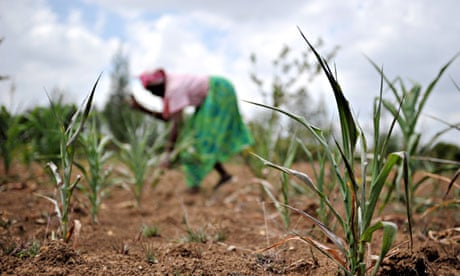Since the droughts and concurrent spike in fossil fuel prices of 2007-2008, the cost of food has risen dramatically across the world. Foreign governments and investors in turn reacted by kicking off a global rush to secure land for agriculture. The purchase or long-term lease of millions of hectares in Africa, Asia and Latin America will transform global farming while investors promise food security.
The reality for many of the world's poor, however, is that few of them will benefit. The parties to these land deals often completed them in secret and overlooked the concerns of local residents and farmers who had lived off the land for generations. Between the global demand for biofuels and the pressure to feed an expected 9 billion people by 2050, this huge shift in land use must both feed and fuel a growing world, yet respect the rights of small landowners who, through no fault of their own, lacked proof that they held rights to use these lands.
The opaque conditions under which these available or empty lands abruptly switched ownership displaced some of the world's poorest families, destroyed lives, and disrupted many communities' food security. The outcry resulting from these murky land deals, from Angola to Argentina, has sparked passionate activism from many NGOs who now provide a voice to the world's landless poor.
To that end, the United Nations earlier this year approved the Voluntary Guidelines on the Responsible Governance of Tenure of Land, Fisheries and Forests in the Context of National Food Security. Circumlocutory title aside, the guidelines offer a framework by which foreign investors can pursue deals and manage these lands in a way that both boosts agricultural capacity and maintains the rights and needs of local communities. Investors have awakened to the fact that securing the rights of local landowners is not only the morally correct stance, but a smart business decision in the long run.
One organisation dedicated to the protection of small landowners is Landesa, a Seattle-based NGO that has worked on land rights for 40 years. Darryl Vhugen, a senior attorney at Landesa, explained that work to bolster land rights should begin the moment such transactions are negotiated. With biofuels, standards such as those of the Roundtable on Sustainable Biofuels (RSB) provide requirements that land deals must follow to guarantee local environmental and cultural sustainability. On farming issues, other multistakeholder initiatives including the World Economic Forum's New Vision for Agriculture earned the buy-in of large food companies that have pledged to pursue responsible land investment and agriculture.
Despite the global business community's increased focus on land rights, Vhugen said: "at this point, the devil is in the implementation." No matter how attentive a multinational such as Unilever or Nestle is to land rights, several issues confront businesses that commit to responsible agriculture overseas.
First, the legal infrastructure within the countries in which these land transactions have occurred is often weak. In addition, the implementation of a responsible land investment policy is a challenge because of the lack of effective governance. Therefore local capacity to carry out proper assessments is an uphill battle due to the lack of trained professionals who can monitor such land deals.
Knowledge silos that emerge between businesses, government agencies and civil societies also create a barrier to the enforcement of effective land rights policies. Vhugen explained that in addition to those multisector silos, multidisciplinary silos also have a negative impact on local farmers' ability to hold onto their lands. The lack of communication and collaboration between water experts, human rights advocates, food security experts and sustainable agriculture specialists is that the most overriding problem, the right to fair and secure land title, falls on the wayside.
The progressive and proactive companies, said Vhugen, are the ones that invest in both the land and people. According to Vhugen, large commercial farming alone will not feed the planet, so small farmers are also key to ensuring food security across the globe. An approach such as nucleus farming, in which large parcels are leased out while surrounding small farmers still till their land, will benefit investors, locals and the environment. Companies that manage large parcels of land could share innovative water and irrigation technologies with local farmers, which would then strengthen communities and boost the yields of small farms.
Such a land use strategy is both smart business and wise land stewardship. In developing countries subjected to the global land rush, one factor behind exhausted soil and depleted water tables is insecure farmers' land rights. No farmer will commit to smarter irrigation practices, invest in expensive but lucrative fruit trees or commit to techniques such as agroforestry if they are unsure about their right to their families' land in a year's time. Therefore, if that family must move, the environmental problems simply become someone else's task.
Many of these "land grab" deals are already completed and cannot be undone. But what investors can do is engage, not evict, the locals, and invest in their future. The results will be not only a more fair and humane policy, but prosperity for everyone who has a stake in these lands.
Leon Kaye is founder and editor of GreenGoPost.com
This content is brought to you by Guardian Professional. Become a GSB member to get more stories like this direct to your inbox

Comments (…)
Sign in or create your Guardian account to join the discussion